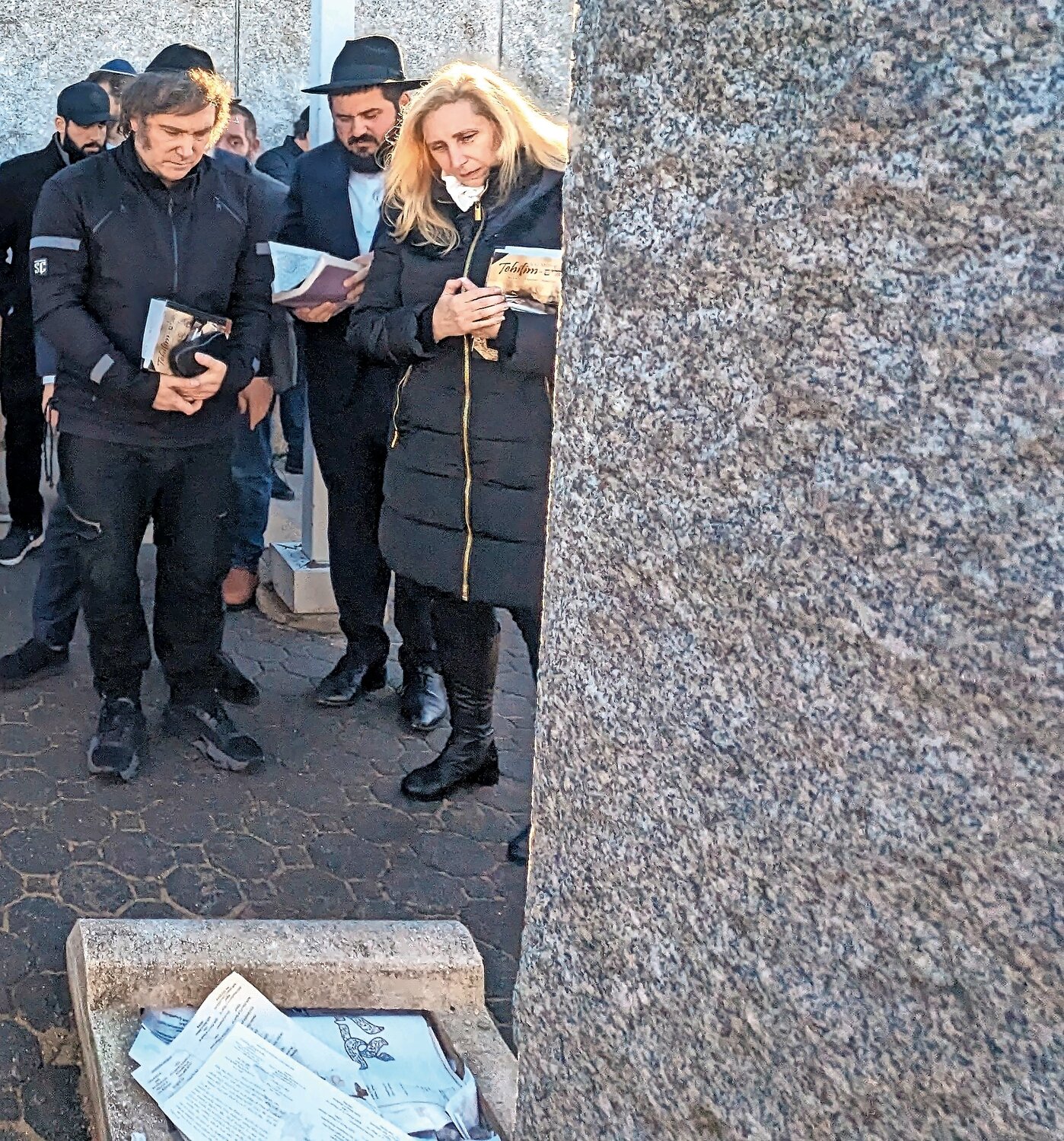Argentina’s new president visits Rebbe’s Ohel
President-elect Javier Milei of Argentina flew to New York and prayed on Monday at the Ohel, the resting place of the Chabad-Lubavitch Rebbe, Rabbi Menachem M. Schneerson, zt”l.
The Roman Catholic-raised Milei has spoken about the inspiration he has gained from the Rebbe and his teachings. Monday’s visit to the Ohel in Cambria Heights, Queens, was his first foreign trip since he won the presidency by a wide margin on Oct. 22.
Milei has made no secret of his philo-semitism, expressing a deep love and admiration for Judaism and the Jewish people. The Argentinian electorate is 92% Catholic, with Jews making up less than 1% of the population.
“I don’t go to church. I go to synagogue. I don’t follow a priest. I follow my rabbi. I learn Torah,” he told La Nacion. “I’m known internationally as a friend of Israel. And as someone who learns Torah, I’m almost Jewish. I’m just missing the ‘blood covenant’.”
“I am thinking about converting to Judaism and I aspire to become the first Jewish president in Argentine history,” Milei has said, according to Argentina’s Radio Perfil. He’s said that what gives him pause is that Sabbath observance would interfere with his presidential duties.
He has promised to move the Argentinian embassy in Israel to Jerusalem and to make the Jewish state his first international stop after he is sworn in as president on Dec. 10.
During the campaign, Milei spoke about his reverence for the Rebbe. In an interview with Argentinian TV last July, he noted that “I was recently in New York and I even had the privilege of visiting the office of the Lubavitcher Rebbe,” and spoke about the Rebbe’s sichot (Torah discourses) and how he treasured a book of the Rebbe’s teachings.
Milei was accompanied by Rabbi Mendy Kotlarsky, director of Merkos L’Inyonei Chinuch’s Suite 302 division, and Chabad scholar and author Rabbi Simon Jacobson.
The Argentinian joins a long list of world leaders who have sought the Rebbe’s blessings and guidance, both before and after the Rebbe was niftar in 1994. Among other heads of state to visit the Rebbe was Luis Alberto Lacalle, former president of Uruguay, who visited the Rebbe in 1989, receiving a dollar and a blessing.
“He had a way of looking at you very, very deeply,” he recalled. “It was a very moving experience” after which “ I have been much more attentive and aware of the message of the Rebbe … and the wider message of the Jewish religion,” he said. His son, Luis Lacalle Pou, is the current president of Uruguay.
In 1966, Israel’s President Zalman Shazar famously broke protocol by directing his limo towards 770 Eastern Parkway in Crown Heights, the Rebbe’s synagogue and headquarters, rather than request that the Rebbe visit him, a head of state, at his Manhattan hotel.
A decade later, just after his election as prime minister of Israel, Menachem Begin visited the Rebbe in Brooklyn on his way to Washington, for his first meeting with President Jimmy Carter. When the three-hour long private audience had ended, a member of the press asked what had been discussed. Begin responded, curtly: “Whatever I say to the Rabbi and he says to me is between us.”
The Rebbe received and corresponded with politicians and statesmen of all political streams and parties — from President Ronald Reagan to Sen. Robert F. Kennedy, and from King Hassan II of Morocco to Brazilian President Jose Sarney — both in public and private, always encouraging them to utilize their unique positions of influence for the betterment of all people.
Agentina has a long history of overt antisemitism. It welcomed Nazis fleeing Germany after World War II (Adolf Eichmann was captured there by Israel agents in 1960). In 1994, 85 people were killed and more than 300 injured at the Asociación Mutual Israelita Argentina, in Buenos Aires, when a bomb-laden van was driven into the building and detonated. Through the years, Agentinian governments attempted to coverup Iran’s ties to the bombing, and failed to prosecute those responsible.
The Chabad-Lubavitch movement has an expansive presence in Argentina, recently inaugurating a 250,000-square-foot Jewish educational complex in the center of Buenos Aires, among other projects. With 200,000 Jews, Argentina has the largest Jewish population in Latin America.






